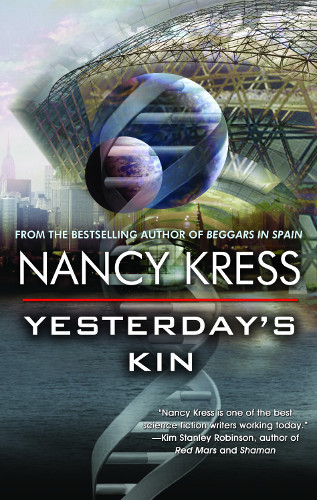YESTERDAY’S KIN is a fast and enjoyable read

The Bookaneer really enjoyed the science in Nancy Kress’ Yesterday’s Kin.
One of the aspects that I really enjoyed in Yesterday’s Kin is the science. The plot involves everything from panspermia to the mitochondrial Eve to the bottleneck event theory. The story itself centres around Marianne and her children, the belligerent Elizabeth, the passionate Ryan, and the hapless Noah. Yet although the story is about families, I felt distanced from all of the characters, unable to connect or empathise with any of them. This strange sense of isolation is oddly fitting: in some ways, the characters are cut adrift from one another, trapped in mutual incomprehension of each others’ minds and hearts. Marianne’s emotional and mental distance from her children, her closest family, serves to reinforce and intensify the book’s overall theme of biological kinship.
<snip>
As always seems to be the case with alien stories, much of the plot focuses on determining which side of the trope these particular aliens fall on. While the overall story is promising, I think this would have worked better as a short story rather than a novel. For me at least, it felt as though much of the book’s volume was taken up with rambling or repetitious scenes, and while these may have served to increase the tension, I found them rather tedious. While the ending is interesting, it is eminently guessable from about halfway through. Perhaps my disconnect from the characters warped my viewpoint, but I felt that given the rather limited worldbuilding, the story was too drawn out for the meagre payoff.
<snip>
At the same time, the book is a fast and enjoyable read. I loved the way that Kress intertwined the themes of alien-human ties with family ones. Some of the characters’ thoughts about relationships were especially poignant.
Read the rest of the review at Bookaneer.
For more info on Yesterday’s Kin, visit the Tachyon page.
Cover by Thomas Canty.
